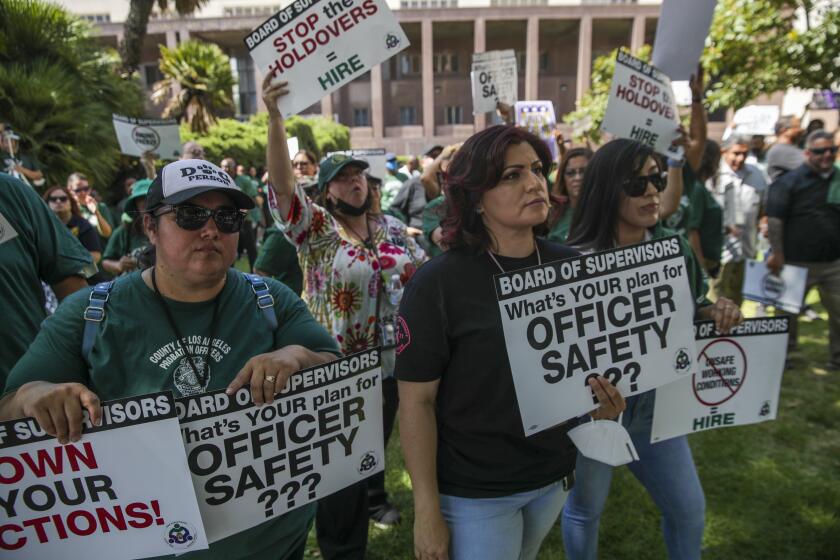Editorial: City Hall or L.A. County? Choose your dysfunction. Then fix it

- Share via
Karen Bass ran for mayor of Los Angeles promising that if elected she would declare a state of emergency on homelessness. She won, and on her first day in office, bam! It was done. State of emergency.
On Tuesday she called on the Board of Supervisors to join her, and bam! —
Actually, no. No bam. No county state of emergency. The board did adopt a motion by Chair Janice Hahn to support the city’s homelessness initiatives (with action to take place next year, because why rush?), but only after an hour or so of discussion, during which each supervisor noted what had already been done or might soon be done on the issue. For example, there was a promise of a board motion, sometime next year (because, again, let’s not get ahead of ourselves), to implement a consultant’s recommendations. When they finally come in.
There historically have been stark differences in style between L.A.’s city and county governments. There is a sort of electricity in the air at City Hall, or at least there is just after the election of a new mayor. Young staffers tend to trot quickly through the hallways and up staircases with a sense of purpose and an eye on the clock (or the calendar). Mayors of the nation’s second-largest city are covered in the national news, and they have agendas to fulfill and reputations on the line. City Council meetings are raucous affairs.
Los Angeles Mayor Karen Bass’ plan to call a state of emergency on homelessness could make a difference.
The pace seems slower at the county Hall of Administration, where the five-headed beast that is the Board of Supervisors is largely anonymous even to constituents, and virtually unknown in the nationwide press despite most members’ long careers in public service. County workers tend to stand still on department-store-style escalators that slowly lift or lower them from one floor of the county administration building to another. They seem to exude a sense of fatalism that their City Hall counterparts sometimes find irritating. Unless there is a pre-scheduled demonstration, Board of Supervisors meetings are generally sleepy.
After Bass left the board meeting, the supervisors took up a motion to instruct the Probation Department to stop using pepper spray in juvenile halls. It was practically identical to a ban the board adopted in December 2019. Since then, pepper spray use actually increased.
How could the department flout the board directive? Why didn’t the board respond until now? Why did the supervisors threaten little more than another motion if the department fails to follow through this time?
L.A. County supervisors approved a ban on the use of pepper spray within certain units of the Central Juvenile Hall, three years after a wider ban went unheeded.
County inaction is legendary, and not in a good way. The board paid hundreds of millions of dollars to rebuild a probation camp that currently is practically empty. Meanwhile it oversees crowded juvenile halls where half the staff doesn’t show up for work. But probation is not a special case. A few months before imposing the pepper spray ban, the board ordered the closure of Men’s Central Jail, but it remains open. The supervisors have been so slow at getting mental health workers to respond when they are needed on emergency calls that the city has developed its own programs, using paramedics and firefighters. Some frustrated city officials have called for creating their own mental health agency. The county has yet to fully follow through on plans to build out alternative services for people who otherwise end up in jail.
The point is hardly that the county’s dysfunction is worse than the city’s. Consider City Hall’s own inadequate action to deal with homelessness. And come to think of it, wasn’t there a city declaration of emergency on homelessness in 2015? Whatever happened to that? It was so widely discussed, it turns out, that national and even international news outlets reported that it really happened. But it didn’t. It was only talk.
None of this is to gainsay the spirit in the county Hall of Administration on Tuesday when Bass and the county supervisors pledged to work together, to “link arms, not point fingers,” on the region’s many pressing challenges. Bass, and newly elected Supervisor Lindsey Horvath, bring a welcome spirit of impatience. It falls to the county to ensure that its inherent prudence does not decay into procrastination, as it too often does, and it’s up to the city to not mistake action for accomplishment.
And it’s up to both to not get hung up on differences in style or bureaucratic culture. The mayor’s and the board’s rededication to cooperation are welcome. Los Angeles won’t thrive without it.
More to Read
A cure for the common opinion
Get thought-provoking perspectives with our weekly newsletter.
You may occasionally receive promotional content from the Los Angeles Times.












